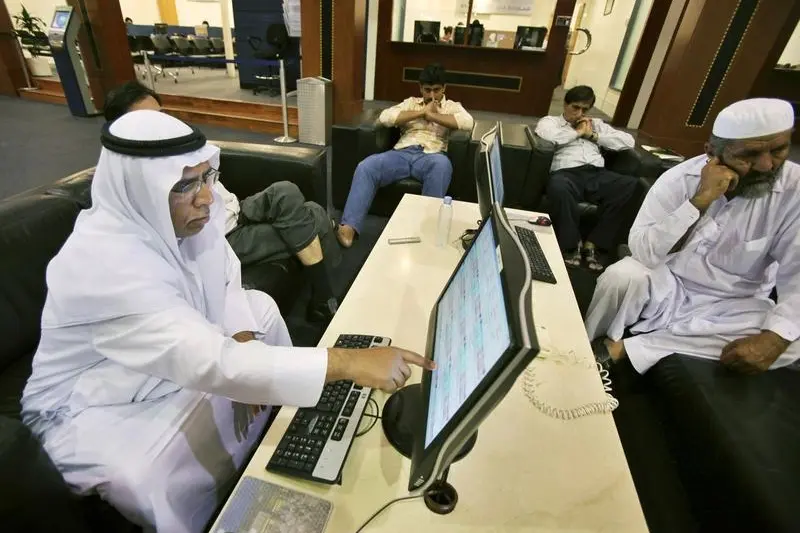PHOTO
DUBAI- Middle East stock markets mostly fell on Monday because of U.S.-China trade tensions, with Dubai sliding despite a new visa policy designed to support slumping real estate prices. Saudi Arabia's market, however, rebounded after a five-day slide.
The United Arab Emirates announced visa rules allowing retired expatriates to stay in the country with renewable five-year visas, which could encourage them to buy homes or make other investments. The government also introduced lower electricity tariffs for the industrial sector.
But stock markets remained weak and the Dubai index lost 0.8 percent to a 32-month low. Blue chip Emaar Properties shed 1.7 percent and DAMAC Properties sank 2.9 percent.
In Abu Dhabi, the index slid 1.7 percent as top real estate firm Aldar Properties dropped 2.7 percent. The biggest bank, First Abu Dhabi , lost 2.6 percent.
"It’s obviously a positive development from a long-term perspective for the UAE real estate sector," Ayub Ansari, senior analyst at SICO in Bahrain, said of the visa policy.
"Near-term, the sentiment in the stock market remains weak and (we) don’t expect much reaction on UAE real estate stocks from this announcement."
A local fund manager said the step was too incremental by itself to move the needle in the stock market, which was waiting to see a promised announcement by the government by the end-year of steps to give 10-year visas to selected investors and professionals.
Dubai inflation data published on Monday showed housing market deflation deepening; housing and utility costs fell 3.6 percent from a year earlier in August, after a 3.2 percent drop in July and a 2.6 percent decline in June.
In Egypt, the stock index shed 0.7 percent to its lowest close this year, after sliding 3.6 percent on Sunday in response to news that an Egyptian criminal court had ordered the arrest of ousted President Hosni Mubarak's two sons on charges of stock market manipulation.
Two stocks that were hit particularly hard by the legal case stabilised on Monday, however. Qalaa Holdings , which had plunged 6.0 percent on Sunday, last traded up 0.6 percent; its investor relations head Amr El-Kadi was detained in connection with case, the company said.
Investment bank EFG-Hermes, which had tumbled 8.6 percent, rebounded 3.3 percent. The company said its non-executive vice chairman Yasser El Mallawany had been detained in connection with the case.
The big exception to the downtrend in regional markets was Saudi Arabia, where the index gained 1.9 percent, rebounding from a six-month low hit on Sunday.
Saudi Kayan Petrochemical 2350.SE was the best performer, soaring 8.1 percent in heavy trade. Bank stocks also did well after reassuring remarks by an official at the central bank during a news conference on Sunday.
Ayman bin Mohammed al-Sayari, the bank's deputy governor for investment, said rising market interest rates were not worrying as they were based on a gradual rise of global rates from a low base, and because Saudi banking system liquidity remained ample.
He also said recent capital outflows from Saudi Arabia had been in large part the result of rising investment by Saudi quasi-sovereign institutions, and that foreign reserves remained in an uptrend.
National Commercial Bank jumped 7.2 percent and Samba Financial Groupadded 5.8 percent.
SAUDI ARABIA
* The index gained 1.9 percent to 7,610 points.
DUBAI
* The index shed 0.8 percent to 2,752 points.
ABU DHABI
* The index lost 1.7 percent to 4,883 points.
QATAR
* The index lost 1.1 percent to 9,833 points.
KUWAIT
* The index edged down 0.03 percent to 5,346 points.
BAHRAIN
* The index decreased 0.2 percent to 1,339 points.
OMAN
* The index lost 1.0 percent to 4,516 points.
EGYPT
* The index slipped 0.7 percent to 14,651 points.
(Editing by Andrew Torchia; editing by David Stamp) ((Davide.Barbuscia@thomsonreuters.com; +971522604297; Reuters Messaging: davide.barbuscia.reuters.com@reuters.net))





















